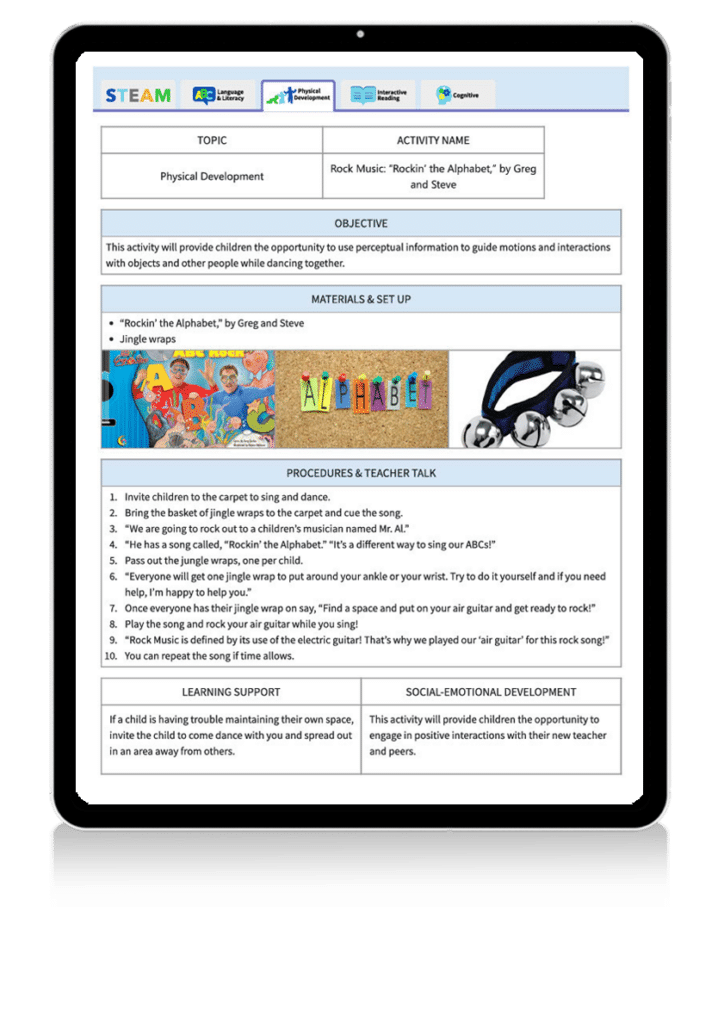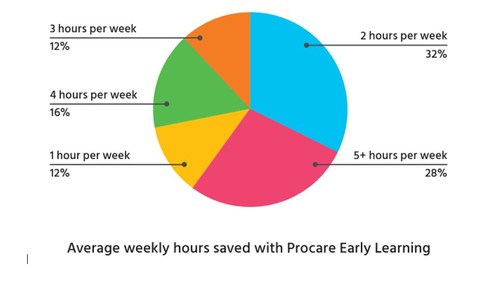
This post was originally published on May 18, 2021, and was republished on May 20, 2022, with updated information.
Cognitive development is a major focus of early learning programs and one of the four developmental domains where we can see each child experience substantial growth. As kids undergo cognitive development, it’s exciting to observe the changes in how they think, learn, process information, solve problems and understand both abstract concepts and the physical world.
The cognitive development of each child progresses rapidly in early life and coincides with profound physical development in the child’s brain. Parents and providers can play a role in nurturing cognitive development in child care settings by facilitating daily interactions with each child that support the progression of eight core cognitive capacities.
Let’s take a closer look at how parents and early childhood educators can nurture cognitive development in child care settings. We’ll highlight the four stages of child cognitive development you should know, explain the eight cognitive capacities and share some of our favorite activities that both parents and child care providers can use to support high-quality cognitive development in kids.
What is Cognitive Development?
The process of cognitive development is related to each child’s evolving ability to learn and process information. Cognition also involves attention, memory, problem-solving, imagination, thinking skills, exploratory skills and the ability to understand and work with abstract concepts.
You might think of cognitive development as a natural complement to the physical developmental domain — but while physical development focuses on the body, cognitive development focuses on the development of the young mind.
Much of our formal knowledge about child cognitive development comes from the work of Jean Piaget in the late 1800s. His development of a framework for child cognitive development makes us think about him as a scientist in modern terms, but Piaget spent a lot of time working in child care settings! His ideas about cognitive development were heavily influenced by the time he spent with his nieces and nephews.
Before his work, experts believed that children and adults exhibited essentially the same thought patterns, but that kids were “slower” at thinking, or simply “not as smart yet.” Piaget’s key insight here was that kids and adults actually don’t think the same way — that kids are still in the process of developing the tools and capacities they need to think like smart adults. By Piaget’s understanding, kids simply had a different way of thinking that reflected their early stage of cognitive development.
What are the Four Stages of Child Cognitive Development?

Based on his observations while working with children, Piaget created a four-stage framework that explains the changes kids experience in their cognitive processes and abilities.
Let’s take a closer look at each developmental stage and its defining characteristics.
First up: The Sensorimotor Stage
Kids are born into the sensorimotor stage of cognitive development and remain in this stage up to around age 2. In this stage of development, kids learn about the world through their sensory experiences (smelling, touching, tasting, hearing and seeing), and by manipulating objects in their environments.
A key element of the sensorimotor stage is the development of object permanence, which is the understanding that objects continue to exist after they disappear from sight. This leads children to the realization that objects can exist outside of their perception and paves the way for more complex cognitive processes like object naming, categorization and abstract thought.
Next on the Docket: The Preoperational Stage
Around the age of 2, kids enter the preoperational stage of cognitive development, remaining there until about age 7. Language development is rapid in the preoperational stage, as children in this stage start to think symbolically and represent their thoughts using words or pictures.
We can observe many interesting behavioral changes during the preoperational stage of cognitive development. Kids start to recognize their own reflections in the mirror, sort objects into various categories (color, shape and type for example), and show an awareness of the past and present. They also become more curious and may ask parents and child care providers a lot of questions about the world they observe around them.

It’s Getting Real: Concrete Operational Stage
The concrete operational stage lasts from ages 7 to 11 and is characterized by the development of logical and organized thought about concrete events. Kids in this stage are developing the ability to rationalize observed events and use logical reasoning to discover the general principles that shape the world around them.
The concrete operational stage importantly coincides with a keypart of social-emotional development: increased empathy. Kids in the concrete operational stage begin to recognize that their thoughts and feelings are their own unique experience and may not be shared by their friends, parents, teachers or child care providers.
The Final Act: Formal Operational Stage
In the formal operational stage of cognitive development, which begins around age 12 and extends through adulthood, kids are able to use deductive logic, engage in abstract thought and rationally analyze hypothetical situations.
These changes will ultimately give each child the ability to engage in complex cognitive tasks, such as anticipating danger, learning from the mistakes of others and creating plans for the future.
Procare Early Learning is Designed for Young Children!

Cognitive development progresses quickly in the first five years of life and it’s vital child care centers have a strong curriculum in place that is designed for young learners.
Procare Solutions, the most widely used child care management software, has teamed up with Learning Beyond Paper, Inc, the leader in digital curriculum, to offer early educators a tool they’ve been waiting for — a fully online curriculum program tailored to child care centers.
Procare Early Learning powered by Learning Beyond Paper is an all-new, all-digital curriculum specifically designed to meet the unique needs of educating children from infancy through pre-kindergarten.
The integration with Procare makes this curriculum easy to use. New content, training and tools arrive automatically! And its saves hours of time each week, which in turn saves your center money.
It embeds Learning Beyond Paper’s early childhood curriculum, which was designed by educators with decades of combined experience, into the Procare platform, making it easier and less time-consuming for busy teachers and administrators to provide high-quality education.
This curriculum can be used in ALL child care center classrooms, with 52 weeks of lesson plans and more than 4,000 daily activities for infants, toddlers, preschoolers and pre-kindergarteners. Learning areas include STEAM, language and literacy, physical development, cognitive, music and movement as well as interactive reading.
With Procare Early Learning powered by Learning Beyond Paper, child care centers can:
- Equip teachers with state-of-the-art online curriculum at their fingertips
- Dramatically reduce the amount of time spent on lesson planning each week
- Offer children a high-quality, developmentally appropriate curriculum
- Save money with this cost-efficient solution that’s embedded in the Procare platform
Plus, teachers get tips and tools they can use in real time!
Want to learn more? Visit www.procaresolutions.com/curriculum and check out these resources as well:
• Download Procare Early Learning Powered by Learning Beyond Paper: What a Digital Curriculum Can Do For Your Child Care Center,” a free eBook, here.
• Read here about how Procare Early Learning will save one West Virginia child care center up to $1,600 a month.
• And check out our blog to learn more about this cost-effective solution that benefits children and sets your child care center a part from competitors!
Procare is the only solution that can deliver the entire early childhood education ecosystem — lesson planning, lesson delivery within the classroom as well as assessment and parent engagement. Being able to do all of these with one platform simplifies classroom management and planning!
Request a Demo
Request a demo and talk with one of our friendly Procare experts to get a tailored child care solution for the unique needs of your business.



